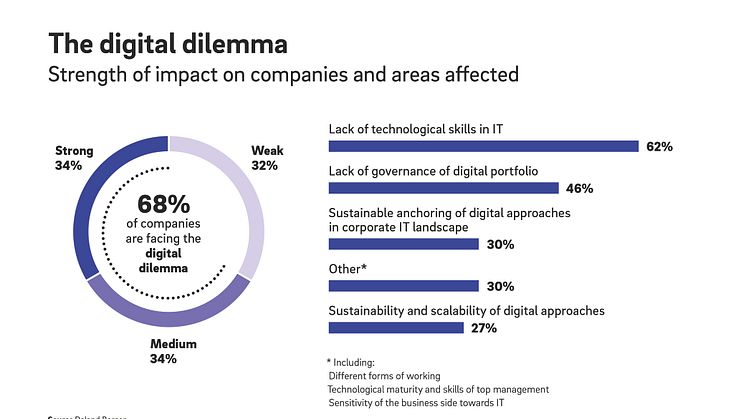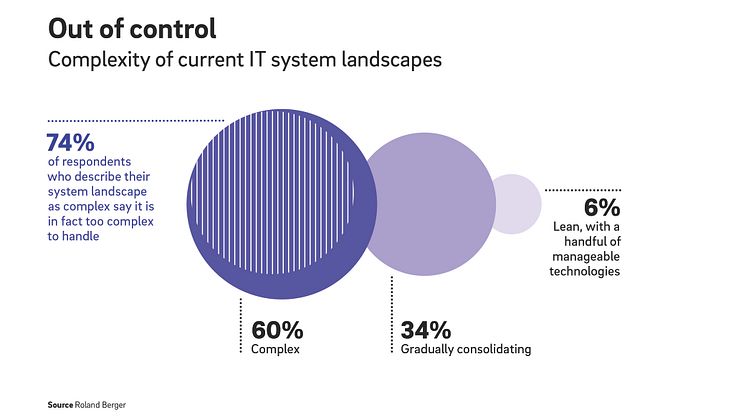
Press release -
More than half of the executives regard their company’s IT infrastructure as too complex
- 68 percent of companies see big challenges when it comes to digital transformation
- The main reasons are the lack of technological knowledge (62 %) and inadequate management of the digital portfolio (46 %)
- One key to resolving this is an integrated business and digital strategy
Munich, July 2022: For years, companies have been talking about the need to accomplish a digital transformation. The idea is to turn the whole organization into a single digital entity in which its employees, customers, suppliers, products, and machines are all interconnected in a data-driven network. Despite substantial investments, these projects have often resulted in disillusionment. In the Roland Berger study, “The digital dilemma – Why companies struggle to master digital transformation,” more than two-thirds of those surveyed say that their company faces challenges in its transformation into a digital organization. More than 50 Board-level executives from leading companies across a wide range of industries were surveyed for this study.
“The ‘digital dilemma’ where companies that are not making progress in their digital transformation find themselves is not usually caused by technological barriers, but because of organizational and strategic shortcomings on the part of those companies. Even important digital initiatives often do not get beyond the pilot project stage,” says Jochen Ditsche, Partner at Roland Berger. “Quite often, there is a lack of influential advocates who can highlight the benefits and opportunities that the projects present. Therefore, those plans fail due to a lack of resources to implement them on a large scale. Executives need to have internalized the digital transformation. Only then will their company be able to attract digital talent, stand out from the competition, and increase its sales growth or achieve further savings.”
Majority of companies are entangled in legacy IT systems and inflexible processes
Out of the companies surveyed, 68 percent state that they are facing the digital dilemma and are not making good progress in their digital transformation – and this applies across all industries. The main reasons for this are a lack of technological expertise (62 %) and inadequate management of the digital portfolio (46 %). 60 percent of those surveyed describe their company’s IT systems as complex, and three-quarters of them go so far as to say that they are no longer manageable. Only six percent of senior executives say their systems are lean and easy to manage.
Digital transformation depends on the workforce’s readiness and capabilities
Another decisive factor – and often an obstacle – in digital transformation is the workforce. According to 69 percent of those surveyed, their teams are not in a position for cross-departmental collaboration, either through a lack of the right skill set or because of the corporate culture. In addition, 70 percent say that their company is missing at least three technological capabilities. Experts who are in greatest demand among the executives are: enterprise architects (77 %), data scientists (60 %) and back-end developers (57 %). At the same time, such specialists are harder to find in a competitive labor market, and it is becoming increasingly difficult to retain employees who possess these skills.
Four building blocks of a digital transformation
According to the study’s authors, the transformation into a wholly digital organization can succeed if companies put together the following four building blocks. First, it is important to develop a joint business and digital strategy, where those in charge of IT are included in the process from the outset. This will help break down silos within the company. The next building block is an effective operating model. To be successful, organizations have to be set up on an agile footing, with all their processes coordinated with each other. One decisive point here is the early introduction of portfolio management boards to allocate resources and to direct all digital, business, and IT processes. In addition, human resources policy should concentrate on the activation, acquisition, and retention of employees. One thing that can help with this, for example, is an annually updated Human Intelligence Map that can show where critical capabilities are needed and where they are available. This will enable impending gaps to be identified and investments to be made at an early stage in training courses or additional job openings. Finally, of great importance is a lean enterprise and data architecture that is assembled on a modular structure and tailored precisely to the company’s needs. The best results will be achieved if companies first introduce data architecture principles and standards for this purpose and pursue a cloud-first strategy.
“Companies have to engage with the ongoing digital transformation in order to be able to continue to hold their own against the competition. There are crucial factors here that executives ought to bear in mind: a comprehensive analysis of digital capabilities in the company, a long-term strategy with a clear goal, constant improvement processes, and a cross-functional task force composed of the most important executives,” so Ditsche. “And there is one more thing, in particular: an awareness that digital transformation first requires a change in mindset among the workforce, which must be advocated for.”
Topics
Categories
Roland Berger is the only strategy consultancy of European origin with a strong international presence. As an independent firm owned exclusively by our partners, we have 51 offices with a presence in all major markets. Our 2,700 employees are characterized by a unique combination of analytical thinking and an empathetic mindset. Driven by our values of entrepreneurial spirit, excellence, and empathy, we are convinced that business and society need a new, sustainable paradigm that focuses on the whole value-creation cycle. By working in interdisciplinary teams across all relevant sectors and business functions, Roland Berger offers the best expertise worldwide for successfully overcoming the profound challenges of our age now and in the future.





